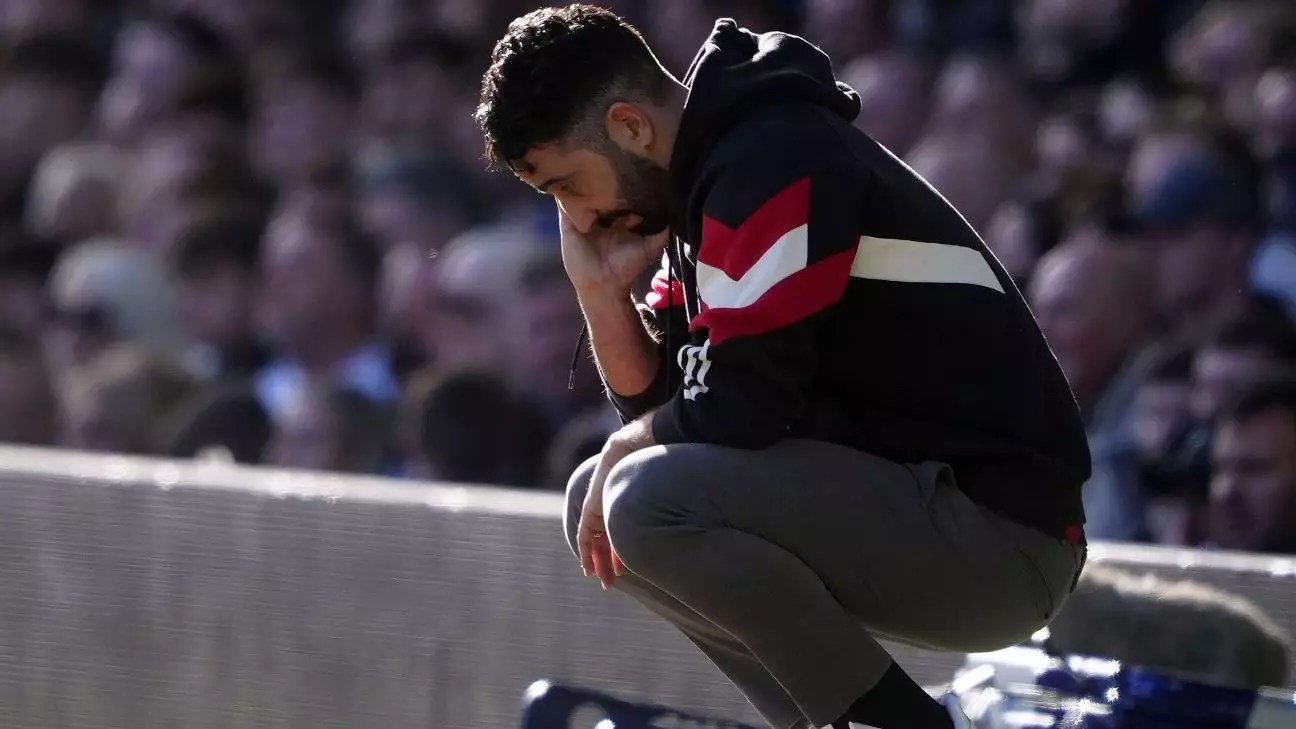In the high-stakes world of professional football, few scenarios evoke as much scrutiny and tension as a struggling head coach at a club with the illustrious history of Manchester United. Ruben Amorim, the Portuguese tactician, finds himself in just such a position as he grapples with the daunting challenge of turning around the fortunes of a team enduring a torrid spell in the league. His recent statements reflect not only his determination but also the undeniable pressure that comes with managing a club that has sky-high expectations.
Amorim’s declaration about not resigning, despite a barrage of poor results—17 losses in the league this season—showcases an inner steel that is crucial for a coach in his predicament. Yet, his acknowledgment that he could be terminated if results do not improve speaks volumes about the precarious nature of his position. In football, loyalty from the board is often tested amidst mounting losses, and Amorim’s fate may hinge on a few key matches, including a critical fixture against Chelsea and an upcoming showdown in the Europa League final against Tottenham.
Facing the Music: Accountability and Expectations
Central to Amorim’s philosophy is a commitment to accountability. His comments concerning the team’s need for improvement resonate with a culture of high expectations that permeates Old Trafford. “What I’m saying is that since I arrived here I’m always talking about the standards,” he remarked, emphasizing the importance of performance metrics that any top club should meet. His insistence on owning the team’s shortcomings, rather than shying away from the harsh realities, reveals his understanding of both the sport and the fanbase’s fervor.
However, the stark truth remains that Amorim’s tenure has been characterized by inconsistency. The disappointing statistic of merely six wins in 26 league matches since his arrival cannot be glossed over. While his commitment to the team is admirable, the sustainability of his position rests on his ability to galvanize the squad quickly. The upcoming matches present an opportunity not just for points but to restore belief within the team and the fanbase—an essential factor, considering the raw emotions that often influence public opinion about managerial effectiveness.
The Balancing Act of Competitions
A daunting aspect of Amorim’s role is the likely progression into European competition. Earning a place in the Champions League via the Europa League can significantly alter the financial and competitive landscape for the club. Nevertheless, Amorim eloquently noted the challenges of juggling the demands of the Premier League and a potential European campaign. “That is my feeling, we need more time with the team,” he stated, acknowledging that the squad must be adequately fortified to compete on multiple fronts.
His insights highlight a crucial factor in modern football—depth and preparation. Premiership clubs require robust squads capable of handling not just the physical toll of back-to-back matches but also the psychological burden of competing at the highest levels. Amorim’s admission indicates a clear vision for strengthening the squad, yet it also underscores a sense of urgency. Should the team falter in the near future, the narrative surrounding his tenure may shift drastically, compounded by the fans’ impatience and the media’s relentless scrutiny.
The Road Ahead: Impending Challenges
As Amorim prepares for the critical finale of the season, he is acutely aware of the precariousness of his position. His reflections on the need for a nearly perfect performance next season underline a reality that many coaches confront—loyalty can often be a fleeting sentiment when the specter of failure looms large. If Amorim intends to retain the confidence of both the club’s hierarchy and its demanding fanbase, he will need to exhibit not only tactical ingenuity but also the ability to inspire his players to perform when the stakes are highest.
What remains to be seen is whether Amorim can navigate through this turbulent landscape and emerge with a clearer path to success. As he grapples with the weight of expectations and the demands of his role, one thing is certain: the coming weeks will serve as a crucial litmus test for both Amorim’s managerial acumen and the resilience of Manchester United as a whole. The dialogue over his future will not simply be about numbers; it’s about the ethos and spirit he can instill in a team yearning for revival amidst the pressure of the Premier League.


Leave a Reply